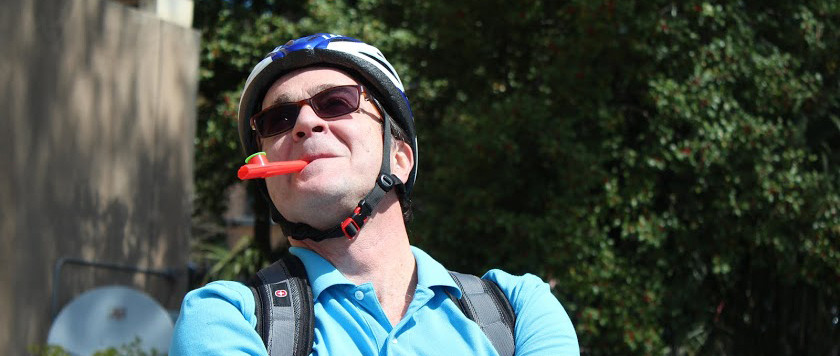Posted June 16, 2015
Reprinted from InterCom (pdf)
Story by Elizabeth Scarborough, senior public relations major
Photo by Holly Stewart, senior visual communications major
Mark Tatge strides into room 3003 of the Coliseum passing out colorful kazoos. “Today’s class lecture is on key income statement components,” he explains. “The kazoo is to help you keep on key.” Tatge then sings, “key income statement components” in a nasally voice on the same note the kazoo hums.
Tatge is teaching Journalism 499, an elective course titled Financial Basics for Communications, while earning his doctoral degree at USC through the Baldwin Business Fellowship.
The fellowship is funded by a $500,000 donation from Mr. Kenneth Baldwin, a 1949 alumnus of the journalism school.
What makes Tatge the ideal recipient of the fellowship is his charisma and ingenuity. He wants students to understand that being well-rounded and having a multifaceted education is what allows people not only to get the kind of jobs “that pay the bills,” but also how to thrive in the business world.
“I’m trying to teach students how to use information, and how to translate that, and make sense of it,” Tatge says.
“Today’s students want to know ‘What is the purpose of this? Why are you having me do this?’” Tatge applies this same concept to his research: How Americans consume news and how the way it is received can alter its message.
“I’m looking at the way information is processed and conveyed in 140 characters,” Tatge says. “What is on the web is not often what it appears to be.”
Tatge marks the controversy over President Obama’s birth certificate as an example of why he chose to do this research. “Many people believe Obama is not actually a citizen of the United States, which I find amusing on one level, but tragic on another.” The White House released President Obama’s birth certificate in hopes of easing this controversy, but the dispute was only escalated.
Detractors enlarged the birth certificate to show parts that some believed were Photoshopped. This information circulated the web in various formats ranging from Twitter to formal news outlets. People who read one story got a totally different perspective than someone who read another.
“Information gets picked up and repeated and repeated,” Tatge says. “People hear and consume sound bites of that, and tend to commit that to reality, and think that it’s true when it’s not. I want to know how this way of consuming information affects us and why. Finally, how is it changing the way we receive news, and ultimately, how we think?”
